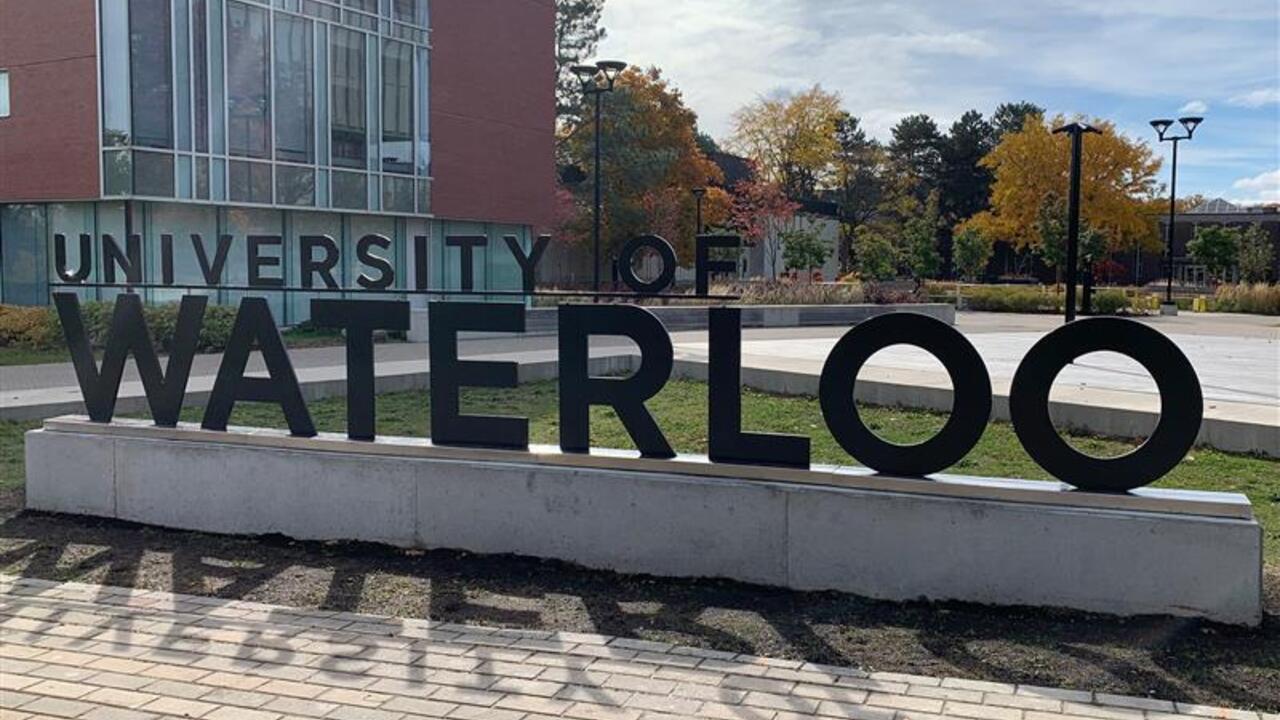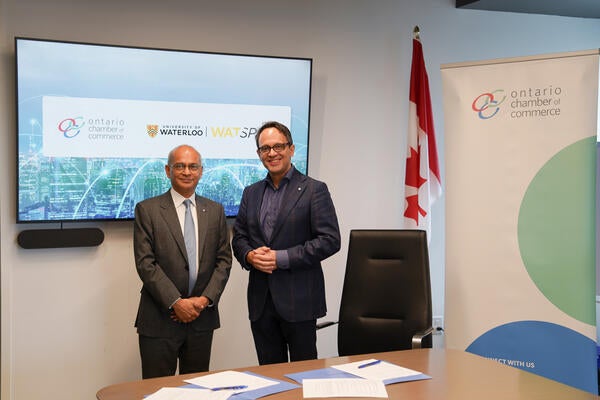
University of Waterloo opens world-class Energy Research Centre, appoints top researcher to Hydro One Chair in Power Engineering
The University of Waterloo today officially opened its new world-class Energy Research Centre.

The University of Waterloo today officially opened its new world-class Energy Research Centre.
By Media RelationsWATERLOO, Ont. (Monday, Oct. 4, 2010) - The University of Waterloo today officially opened its new world-class Energy Research Centre, which will support cutting-edge research and technology development in energy conversion.
At the opening ceremony this morning, the university also announced the appointment of University of Waterloo professor Claudio Cañizares as the inaugural Hydro One Chair in Power Engineering. The Hydro One Chair in Power Engineering is funded by a $2.5-million agreement signed last year with Hydro One Networks Inc.
The Energy Research Centre provides a focal point for energy research groups in the faculty of engineering at Waterloo, including the Centre for Advanced Photovoltaic Devices and Systems (CAPDS), solar thermal research laboratory, energy and pollution modelling, and fuel cell research and development labs.
"The University of Waterloo has made energy a top strategic priority and through the Waterloo Institute for Sustainable Energy (WISE), we address the full spectrum of sustainable energy R&D, education, partnerships and commercialization," said Jatin Nathwani, executive director of WISE. "Energy challenges continue to command attention at the national and international levels. It is a reasonable premise that a healthy energy equation requires balance among the energy sources: those we know and those that we have yet to discover."
In its 14,000-square-foot research facility on the ground floor of the Energy Research Centre, CAPDS conducts key work in photovoltaic energy conversion, which turns sunlight into energy.
The Energy Research Centre also houses laboratories in the department of mechanical and mechatronics engineering: solar thermal research lab, which develops new solar thermal technologies mainly aimed at housing; advanced glazing system lab, which analyzes energy-efficient glazing systems and shading devices; and lab for fuel cell and green energy research and development, which investigates cost-effective and reliable fuel cell technology and clean biodiesel engines. Research is also carried out in pollution dispersion and energy storage through computer modelling.
The rooftop of the Energy Research Centre features test platforms for the solar thermal lab and for wind turbine acoustics, which examines the causes of excessive wind turbine noise.
Funding for the Energy Research Centre came from Canada's federal government, Ontario's provincial government, industry and the University of Waterloo. The 43,200-gross-square-foot Energy Research Centre cost $11.4-million to build. Federal and provincial government funding totals $31.3 million for lab equipment and research support.
"The federal government is committed to supporting cutting-edge research at world-leading educational institutions like the University of Waterloo," said Peter Braid, MP for Kitchener-Waterloo. "By providing labs for research into green technologies like wind and solar power, this centre will make a major contribution to developing innovative solutions for a sustainable environment."
"The Energy Research Centre is an impressive example of the type of partnerships that are essential to ensure Canada’s success in the knowledge-based economy and the Canada Foundation for Innovation is proud to be a partner in this venture," said Gilles G. Patry, president and CEO of the CFI.
As Hydro One chair, Cañizares will support research in smart grid power distribution and management, alternative energy and sustainability projects, along with graduate student investigations. The chair will contribute significantly to work on how to integrate clean energy technologies into the grid as well as address specific issues of the electricity sector through research, development and deployment projects.
The Waterloo Institute for Sustainable Energy (WISE) will oversee the Hydro One Chair agreement. WISE comprises more than 80 faculty members with graduate students and postdoctoral fellows working in multi- disciplinary research teams across engineering, science and environment. Researchers investigate innovative technologies and alternatives to existing energy production and delivery systems, along with energy efficiency and environmental sustainability.
About CFI
The Canada Foundation for Innovation (CFI) is an independent corporation created by the Government of Canada to fund research infrastructure. The CFI's mandate is to strengthen the capacity of Canadian universities, colleges, research hospitals, and non-profit research institutions to carry out world-class research and technology development that benefits Canadians. Since its creation in 1997, the CFI has committed $5.3 billion in support of 6,800 projects at 130 research institutions in 65 municipalities across Canada.
About Hydro One
Hydro One delivers electricity safely, reliably and responsibly to homes and businesses across the province of Ontario and owns and operates Ontario's 29,000 km high-voltage transmission network that delivers electricity to large industrial customers and municipal utilities, and a 122,000 km low-voltage distribution system that serves about 1.3 million end-use customers and smaller municipal utilities in the province. Hydro One is wholly owned by the Province of Ontario.
About Waterloo
The University of Waterloo, located at the heart of Canada's Technology Triangle, is one of Canada's leading comprehensive universities. Waterloo is home to 30,000 full- and part-time undergraduate and graduate students who are dedicated to making the future better and brighter. Waterloo, known for the largest post- secondary co-operative education program in the world, supports enterprising partnerships in learning, research and discovery. For more information about Waterloo, visit www.uwaterloo.ca.
Contacts:
Jatin Nathwani, executive director, Waterloo Institute for Sustainable
Energy, 519-888-4567 ext. 38252 or nathwani@uwaterloo.ca
John Morris, Waterloo media relations, 519-888-4435 or jmorris@uwaterloo.ca
Waterloo release no. 76

Read more
President of Waterloo EDC says the University of Waterloo plays a pivotal role in region’s economic development on the global stage

Read more
The faculties of Science and Arts introduce a new theatre and performance course tailored to Science students

Read more
Waterloo’s WatSPEED to provide businesses with access to AI upskilling programs in new province-wide initiative
The University of Waterloo acknowledges that much of our work takes place on the traditional territory of the Neutral, Anishinaabeg and Haudenosaunee peoples. Our main campus is situated on the Haldimand Tract, the land granted to the Six Nations that includes six miles on each side of the Grand River. Our active work toward reconciliation takes place across our campuses through research, learning, teaching, and community building, and is co-ordinated within the Office of Indigenous Relations.